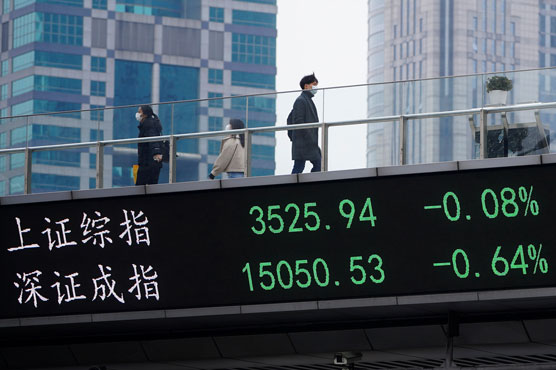Asian markets, oil rise after sell-off but virus casts shadow

Business
Asia started Tuesday on the front foot.
HONG KONG (AFP) - Equities stabilised and oil prices saw a much-needed gain Tuesday after their latest flop as bargain-buyers moved in, though investors remain fixated on the fast spreading Omicron variant and moves to contain it over the festive period.
Reports that moderate Democrat senator Joe Manchin could still be willing to discuss Joe Biden’s $1.75 trillion social spending bill -- having delivered a blow to the White House Sunday by rejecting it -- were also providing a little support, though talks would likely drag.
Markets have been lashed since the emergence of Omicron as it spreads quickly through populations and forces governments to impose measures to protect their populations, but which are economically damaging.
The Netherlands has imposed a lockdown over the holiday period, Germany has tightened restrictions notably affecting the unvaccinated and media speculation swirls over possible tougher UK curbs.
"There is more uncertainty than I think most people thought we would see here as they were anticipating a Santa Claus rally," said Victoria Fernandez of Crossmark Global Investments on Bloomberg Television.
"Volatility and uncertainty are the key terms that will lead us into the new year."
And National Australia Bank’s Ray Attrill added: "For now... it’s the short term economic impact of the virus spread and related restrictions that is front and centre of market focus."
All three main indexes on Wall Street ended down more than one percent, though they pared early losses.
And Asia started Tuesday on the front foot. Tokyo added two percent, while there were also healthy gains in Hong Kong, Shanghai, Sydney, Seoul, Singapore, Taipei and Jakarta.
Crude joined equities, with both main contracts seeing gains of at least one percent, having been hammered in recent days by concerns that new Omicron measures will erase demand, with travel curbs already in place in several countries and many people choosing to stay home.
The latest wave of Covid infections comes just as central banks around the world begin to remove the ultra-loose monetary policies put in place at the start of the pandemic to protect economies from the ravages of lockdowns.
The Bank of England announced a surprise rate hike this month, joining a number of others, while the Federal Reserve finally gave up on its insistence that inflation would be temporary and announced a faster taper of its vast bond-buying programme.
The US central bank is then tipped to lift borrowing costs three times before the end of 2022, bringing the curtain down on the era of cheap cash that has helped fuel a global market rally since the early days of the Covid crisis.
"Monetary policy normalisation will continue to bring volatility and will maintain the bull-bear debate between growth and value," said Zehrid Osmani, at Martin Currie investment manager.
"The Omicron variant may disrupt both economic momentum and monetary policies, should it lead to renewed significant lockdown measures."
The Turkish lira dropped against the dollar, having surged Monday in response to measures announced by the government to bolster the beleaguered currency.
The unit had been suffering another heavy selling session after President Recep Tayyip Erdogan affirmed at the weekend that his Islamic faith prevented him from supporting rate hikes to bring inflation under control, instead opting to reduce costs.
However, observers said he bowed to market pressure and raised rates by stealth when he announced a complex series of measures Monday.
The currency saw its biggest jump since 1983, according to Bloomberg News, before paring the gains.

